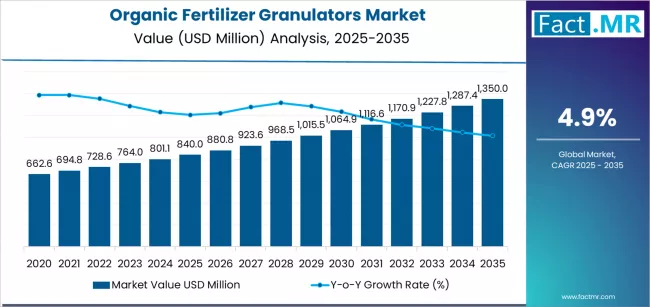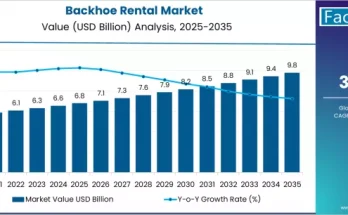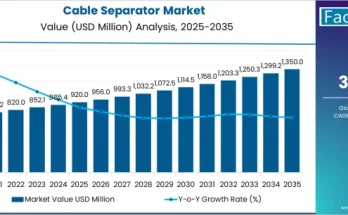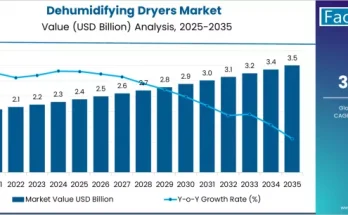As the global agricultural industry pivots toward sustainability and eco-friendly farming practices, the organic fertilizer granulators market is emerging as a vital enabler of the green revolution. These machines, which transform organic waste into nutrient-rich granules, are gaining immense popularity as farmers and industries increasingly adopt organic farming methods to improve soil health and reduce chemical dependency.
Organic fertilizer granulators play a crucial role in processing raw organic materials such as compost, manure, and crop residues into uniform granules that are easy to handle, store, and distribute. Their growing adoption reflects a broader global commitment to sustainable crop production and efficient nutrient recycling — key pillars of modern agriculture.
Market Overview
The organic fertilizer granulators market forms a dynamic part of the broader agricultural machinery sector. These machines help convert biodegradable materials into stable, high-quality fertilizer granules, minimizing waste and promoting soil enrichment.
As global focus intensifies on soil conservation, carbon neutrality, and resource efficiency, granulation technology has gained attention for its ability to improve nutrient retention and reduce environmental pollution caused by untreated organic waste. Manufacturers are continuously developing advanced granulators that ensure high output efficiency, low energy consumption, and minimal maintenance requirements.
Additionally, the integration of automation, smart sensors, and process control systems in granulators has enhanced their precision and consistency. This innovation trend is transforming the production of organic fertilizers from a manual process into an industrially efficient operation.
Regional Insights
North America
North America remains a key market for organic fertilizer granulators, driven by increasing awareness of sustainable agriculture and waste-to-fertilizer conversion. The region’s regulatory emphasis on soil conservation and organic farming practices has encouraged both small and large-scale producers to invest in advanced granulation equipment. Moreover, ongoing innovation in biofertilizer formulations is supporting the demand for efficient granulation machinery.
Europe
Europe has been at the forefront of environmental sustainability and circular economy initiatives. The growing restrictions on chemical fertilizer usage and strong governmental support for organic farming are propelling market growth across European countries. Manufacturers in the region are focusing on developing energy-efficient granulators that align with environmental protection norms and support high-quality fertilizer output.
Asia-Pacific
Asia-Pacific represents a rapidly expanding market due to rising agricultural activities and a growing preference for organic food products. Countries like China and India are witnessing a surge in investments toward organic fertilizer manufacturing to address soil fertility challenges and reduce the environmental footprint of farming. The availability of agricultural residues and livestock waste further enhances the region’s potential for organic fertilizer production.
Rest of the World
Latin America and the Middle East & Africa are gradually adopting organic fertilizer granulation technologies, primarily driven by the need to improve soil productivity and manage agricultural waste efficiently. Increasing awareness about sustainable farming and government-led rural development programs are paving the way for market expansion in these regions.
Key Trends & Forecast
- Adoption of Automation and Smart Controls
The incorporation of digital technologies and automation is transforming traditional granulation processes. Smart sensors and control systems enable real-time monitoring of moisture, temperature, and pressure, resulting in more consistent granule quality and optimized energy use. - Shift Toward Eco-Friendly Production
As environmental concerns intensify, manufacturers are prioritizing designs that reduce energy consumption and emissions. Eco-efficient granulators are being developed using sustainable materials and modular components that simplify maintenance. - Integration of Bio-Based Fertilizer Production
The demand for bio-based fertilizers derived from plant and animal waste is increasing. This trend is driving innovation in granulator designs capable of handling a diverse range of raw materials while maintaining product uniformity and nutrient stability. - Rising Popularity of Small and Mobile Granulation Units
Small-scale and portable granulators are becoming popular among farmers and cooperatives, offering flexibility for on-site production. This localized approach reduces logistics costs and promotes the circular use of organic waste. - Focus on Waste Valorization
The concept of waste valorization — converting agricultural, municipal, and industrial waste into useful products — is boosting demand for granulators. Governments and environmental organizations are promoting this practice to minimize landfill waste and create value-added organic fertilizers.
Applications & End-Use Outlook
The applications of organic fertilizer granulators extend across multiple sectors, reflecting the growing emphasis on sustainable agriculture and environmental management.
- Agriculture and Horticulture: Granulated organic fertilizers improve soil texture, water retention, and nutrient availability, supporting the long-term health of crops and plants.
- Livestock and Poultry Farms: Manure from farms is processed into granules, converting waste into valuable fertilizer and reducing odor and pollution.
- Composting and Waste Management: Municipal and industrial composting units use granulators to process organic waste into stable, marketable fertilizer products.
- Agrochemical Industry: Fertilizer manufacturers employ granulators to standardize product size, improve nutrient concentration, and enhance shelf stability.
- Home and Community Gardening: Compact granulation systems are gaining attention in small-scale urban farming and gardening initiatives, promoting self-sufficiency in organic fertilizer production.
As consumer demand for organic produce grows, end-users are focusing on integrating granulation systems into their production lines to ensure high-quality, eco-friendly fertilizer output.
Challenges and Opportunities
Despite the promising outlook, the organic fertilizer granulators market faces certain challenges. High initial investment costs, maintenance requirements, and a lack of technical expertise in developing economies can limit adoption. However, these challenges are being mitigated by innovations in cost-efficient designs, training programs, and government incentives for organic farming.
The growing interest in biodegradable and carbon-neutral farming solutions presents vast opportunities for manufacturers. Emerging trends such as decentralized fertilizer production, digital monitoring systems, and modular equipment designs are likely to reshape the competitive landscape. Moreover, partnerships between equipment manufacturers, agricultural cooperatives, and sustainability organizations are accelerating technology transfer and market penetration.
Conclusion
The organic fertilizer granulators market stands at the intersection of sustainability, innovation, and agricultural productivity. As the world shifts toward greener and more resource-efficient farming practices, the demand for advanced granulation technologies is set to surge.
By transforming organic waste into valuable, nutrient-rich fertilizers, granulators not only support soil health and crop yield but also contribute to a cleaner environment. For agribusinesses, farmers, and policymakers, investing in modern granulation solutions represents a strategic move toward sustainable growth and environmental stewardship.
The future of the market will be defined by technological progress, regulatory support, and a global commitment to regenerative agriculture — making organic fertilizer granulators a cornerstone of the next agricultural revolution.
Browse Full Report – https://www.factmr.com/report/558/organic-fertilizer-granulators-market



